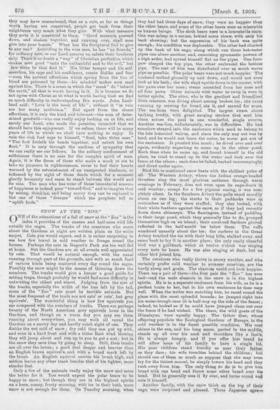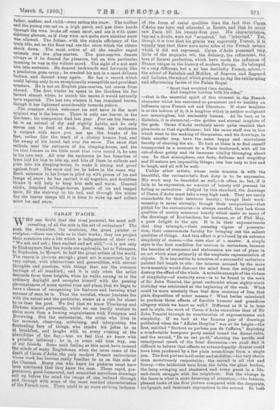SNOW AT THE " ZOO."
rINE of the attractions of a fall of snow at the" Zoo" is the
index it provides of the unseen and half-seen wild life outside the cages. The tracks of the creatures who move about the Gardens at night are written plain on the while carpet. Cats you would expect, and it is rather surprising to see how few travel in cold weather to forage round the houses. Perhaps the cats in Regent's Park are too well fed at home. Mit the Gardens are at all events well appreciated by rats. That would be natural enough, with the canal running through part of the grounds, and with so much fopd of variety; kinds being scattered every day round the cages. Possibly the snow might be the means of thinning down the numbers. The tracks would give a keeper a good guide for setting traps, though probably be would find some difficulty in outwitting the oldest and wisest. Judging from the size of the tracks, especially the width of the line left by the tail, some of the " Zoo" rats must be terrible animals. But the most frequent of the trails are not cats' or rats', hat grey squirrels'. The wonderful thing is how few squirrels you see compared with the numbers of tracks. There are perhaps twenty of the North American grey squirrels loose in the Gardens, and though on a warm day you may see them running about everywhere, you may walk all round the Gardens on a snowy day and hardly catch sight of one. They dislike the wet cold of snow ; dry cold they can put up with, and even in a hard frost and with a hitter East wind blowing they will jump about and run up to you to got a nut; but in the snow they save time by going to sleep. Still, their tracks are all over the lawns ; a good deal deeper and heavier than an English brown squirrel's, and with a broad mark left by the brash. An English squirrel carries his brush high, and seldom leaves any other track besides that of his lighter, more slender feet.
Only a few of the animals really enjoy the snow and seem the better for it. You would expect the polar bears to be happy in snow; but though they are in the highest spirits on a keen, sunny, frosty morning, with ice in their bath, mere know is not enough for them. Op Tuesday morning, when they had had three dap; of snow, they were no happier than the other bears, and some of the ether bears were as miserable as hupien beings. The sloth bears were in a larnenlabls One was asleep in a corner, behind some straw, with calY hie back showing; but the expression of his back was quite enough; his condition was deplorable. The other had climbed up the back of his cage, along which run three hot-water pipes one above another, and, exercising gymnastic powers of a high order, had spread himself flat on the pipes. One fore: paw clasped the top pipe, the other embraced the bottom pipe. The rest of him was distributed over ae much warm pipe as possible. The polar bears were not much happier. The husband walked gloemily up and down, arid would not even look at his bath; the wife slept upside down in the corner, with her paws over her nose ; steam ascended from her nose and all four paws. Other animals with water to swim in were in better spirits." The otter, who is the gentlest and friendliest little creature, was diving about among broken ice ; she cuing running up mewing for bread, ate it, and mewed for mere. The sea-lions Were delighted. The largest swam about barking loudly, with great Barging strokes that sent hint clean across the pool in one wonderful, single swerve, Another sea-lion, unfortunately, was in difficulties. He had somehow strayed into the enclosure which used tq belong to the late lamented walrus, and since the only way out was by land, and he would not leave the water, be never got out of the enclosure. It puzzled him much ; he dived over and over' again, evidently expecting to come up in the other pond. Each time when he came up, and found himself ip the old place, be tried to stand up in the water and look over the fence at the others; each time he failed, barked enoouragingljri and dived under again. Bird life in continued snow beats with the chilliest pulse g all. The Western Aviary, where the Indian orange-headed thrushes sing the most glorious anthems through warn evenings in February, does not even open its cage-doors hi cold weather; except for a few pigeons cooing, it was cot* pletely silent. In the Southern Aviary the gulls stood moodily about on one leg; the storks in their paddocks were ae motionless as if they were stuffed; they also looked, with their white feathers against the snow, as if they had recently flown down chimneys. The flamingoes, instead of paddling in their large pond, which they generally like to do, grouped thempelves high on an island ; their coral-red feathers glowed reflected in the half-sunlit ice below them. The ruse wandered uneasily about the ice; the curlews in the Great Aviary touched the ice with their long bills, stalked away, and came back to try it in another place; the only really cheerful bird was a goldfinch, which at twelve o'clock was singing every Elite he knew. He was also singing at dusk, but PO other bird joined him.
The creatures who really thrive in snowy weather, and whe certainly prefer cold weather to Rummer suushine, are the hardy sheep and goats. The chamoie mild not look happier. There are a pair of them—the first pair the " Zeo " has ever had—and the male chamois in the snow is in the highest spirits. He is in a separate enclosure from hie wife, as he is a perfect brute to her, but in his own enclosure he does very well. When the writer was watching him, he raced round the place with the most splendid bounds ; he jumped right into his water-trough once (it is half-way up the side of the fence); indeed, he looked as if he could have jumped clean out over the fence if he had wished. The there, the wild goats of the Himalayas, were equally happy. The father thar, whose offspring populate the Zoological Gardens of NtIrgpe, in the cold weather is in the finest possible condition. His coat shines in the sun, and his long mane, parted in the middle, stands up all over his neck and shoulders like a lion's, He is always hungry, and if you offer him bread he will allow none of his family to have a single bit, His poor children stand timidly as near their father; as they dare ; his wife trembles behind the children; but should one of them so much as suppose that she may even
try for the tiniest morsel, he simply lowers his head and they rush away from him. The only thing to do is to give him
bread with one hand and throw some other bread over hie head. But he generally sees it fly over, and turns round a44 eats it himself.
Another family, with the snow thick on the top of their cage, were surprised and pleased. Three Japanese apes—. . _ .
father, mother, and child—were eating the snow. The mother and the young one sat on a high perch and put their hands through the wire, brake off some eUQW, and Ate it with queer sidelong glances, as if they were 1194 quitt) sure whether snow was allowed. The father, with the simple efficieney of the truly idle, sat on the fiClOr and ate the snow which the others shook down. The meet active of all the smaller caged asnsnals was the pine-marten. The pine-marten dances always as if he danced fey pleasure, but on this' particular morning he was in the wildest mood. The eight of a nut sent him into ecstasies. He danced backwards and forwards like a pendulum gone crazy ; he cracked his net in a most delicate fashion and danced away again. He has a record which could belong only to an exceptionally susceptible and provident creature. He is not an English pine-marten, but comes from abroad. The that winter he spent in the Gardens his fur turned almost white, to match the snows it would naturally have expected. The hoot two winter* it has remained brpwn, though it has lightened considerably towards yellow.
The creature which welcomes iee and snow in the most original way is the beaver. There is only one beaver in the Qarcleas his companion died last year. :Few see the beaver; hp is an animal of shy and ;lightly habits, and he only ";iniee put to feed at (leek. But when his enclosure ie covered with snow you can flee the tracks of his feet, rather like the track of a clumsy human foot, and the sweep of his broad tail over the snow. The snow that willed; near the entrance of his sleeping-house, and the ice that freezes on the little moat that runs round it he uses iu his !awn way. All ever his enclosure he has branches of trees laid for him to bite up, and bits of these he collects and piles into his sleeping-house, to make it strong and proof against frost. The snow and ice he takes in the same way Each entrance; to his house is piled up with pieces of ice and lumps of snow; he has carried it all together, and doubtless thinks it will help to keep him safe and warm. Gnawed Sticks, detached. cabbage-leaves, panels of ice and heaped Snow, fill the stairway to his bed, and through the winter day the beaver sleeps till it is time to wake up and polled more ice and snow.















































 Previous page
Previous page